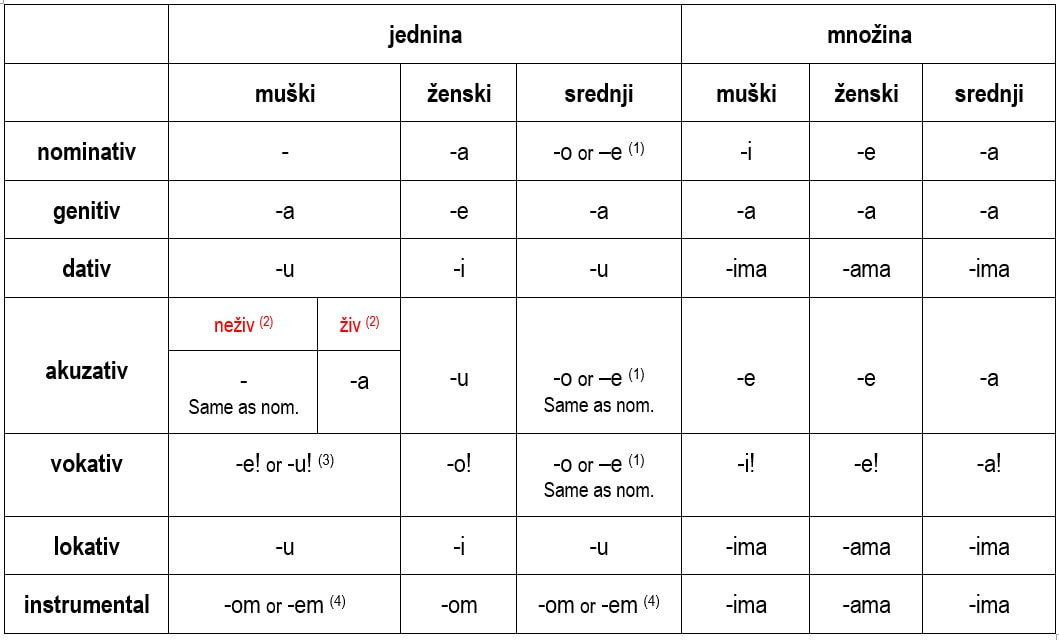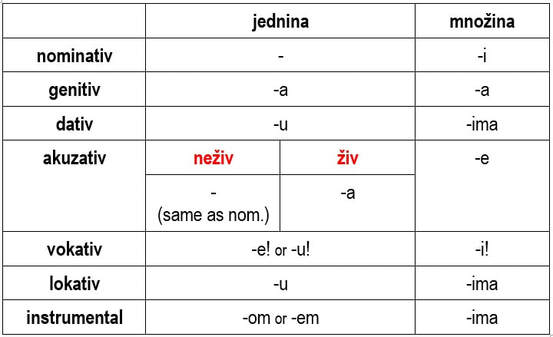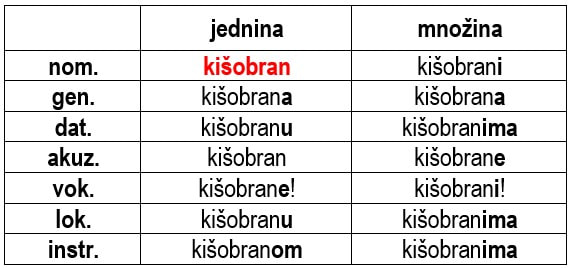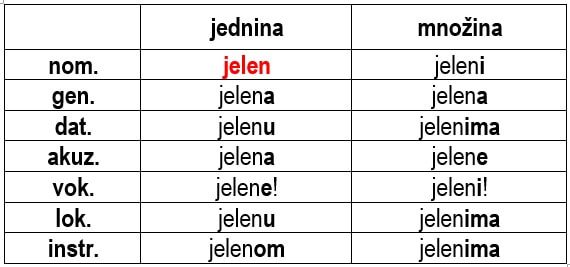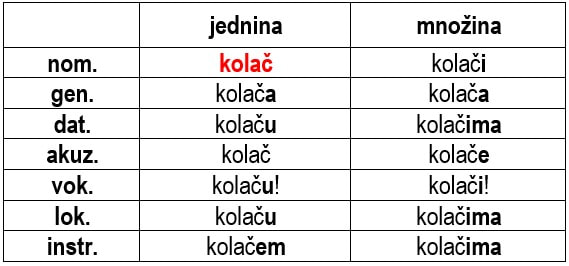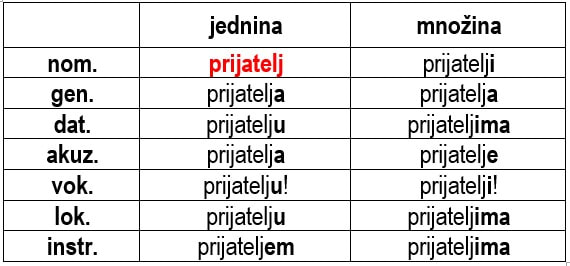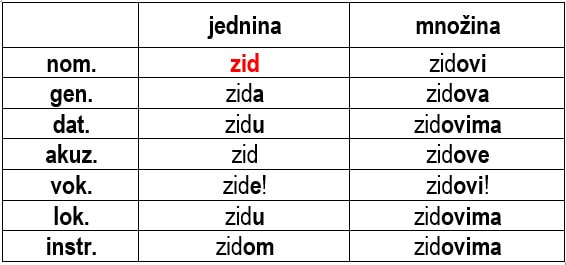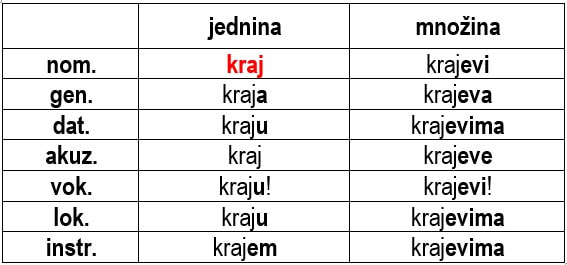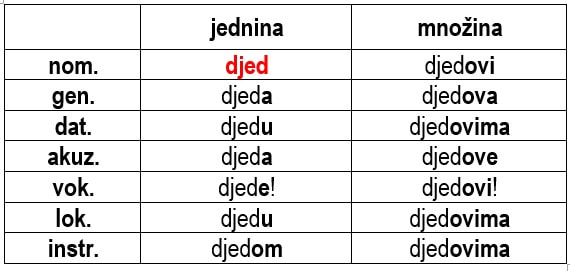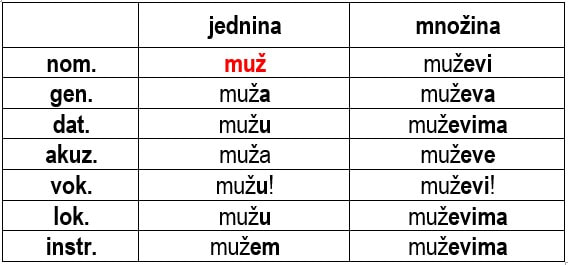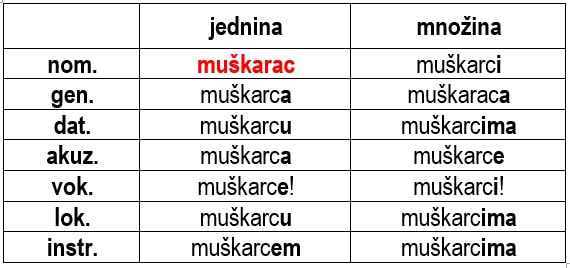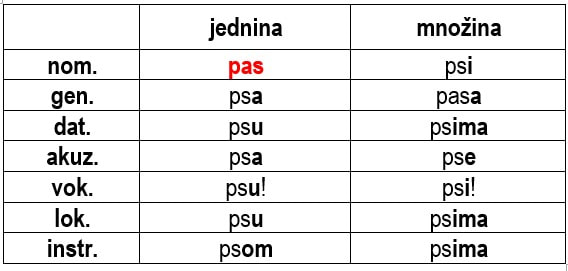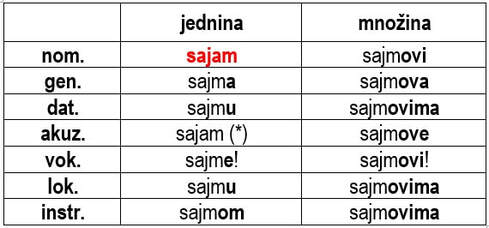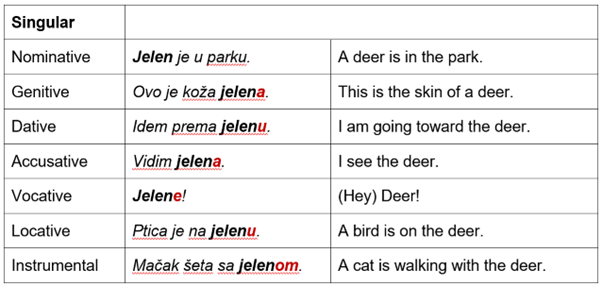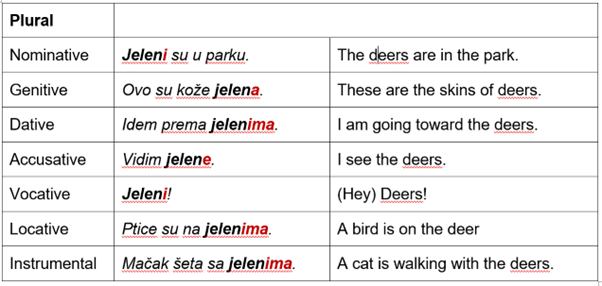Croatian grammar reference /Nouns #005Declension of regular masculine nouns
How do the endings of regular nouns change, depending on case, in sentences?
The endings of regular masculine nouns are different from those of regular feminine nouns and regular neuter nouns.
Wow! When I decided to summarise the declension of regular nouns, little did I realise how complex things are!
In a word, the declension of regular masculine nouns is un-summarizable. There are so many variations on the “regular” that I don’t even know any longer whether the declensions of some nouns are variations of the regular, or irregular! But’s let’s kick on, and explore some of the jungle ……..
The declension of nouns refers to how we change them (usually by changing their endings) to indicate their role in sentences – that is, the case.
In the post Grammar reference section/Nouns #004: Declension categories, all the nouns in any one category have similar endings when declined – and these are different from the endings of the nouns in any other category. In that post, the so-called “regular nouns” are listed as category 1. These include: (1(a)) muški rod; (1(b)) ženski rod; and (1(c)) srednji rod. Even the regular nouns have some irregularities of declension. Here is my modification of the universal table of regular noun endings usually presented in textbooks. I hope my version is more clear than others?
Footnote (1): Some neuter nouns (nominative singular) end with –o (selo, vino), and some with –e (more, sunce). There is no 'rule' about which ones end with -o, and which ones end with -e. Footnote (2): The ending for animate nouns in accusative case is different from that for inanimate nouns. Footnote (3): In the masculine singular vocative case, the suffix is –e if the end of the noun (singular, nominative) is a “hard” consonant, but –u if the noun ending is one of the “soft” consonants c, ć, č, š, đ, dž, lj, nj, j. Footnote (4): In the instrumental case, singular, of masculine and neuter nouns, the ending –om is used if the end of the noun (singular, nominative) is a “hard” consonant, but –em if the noun ending is one of the “soft” consonants c, ć, č, š, đ, dž, lj, nj, j. Not shown in the table are ..... - Infix -ov or -ev between the stem and the ending, for plural monsyllabic masculine nouns (See below). - 'Fleeting -a' from masculine nouns with a as the second-last letter (in the nominative form) (See below). - Any modifications to noun endings due to sibilarization or palatalization.
Surprise, surprise, there are a few little variations from noun to noun - especially masculine nouns – as indicated in footnotes (3) and (4). Surprise, surprise, there are other types of variations not indicated in this table, but which I will talk about below.
I suspect that this table with noun endings for all genders, singular and plural, in all cases, has been designed to save space and cost in textbooks. It is the universal table – everything in one place. I find it useful to use a particular table for each of the genders. So, below is a separate table for Category 1a (muški rod). I give examples of the declination of various nouns to illustrate variations.
1a. Regular masculine nouns: the nominative singular form of the noun ends in a consonant.
This table, particular to standard masculine nouns, shows, for each case, in both singular and plural, the standard endings ..... And following are the declensions of a few regular masculine nouns - specifically chosen to illustrate variations from noun to noun. The differences depend upon whether (i) the noun refers to an animate or inanimate object, (ii) the end is a “hard” or “soft” consonant, (ii) whether the noun is monosyllabic or polysyllabic, and (iv) if the ending is –ac.
Polysyllabic masculine nouns, with 'hard' consonant ending - inanimate vs. animate
Polysyllabic masculine nouns, with 'soft' consonant ending - inanimate vs. animate
Infix in monosyllabic inanimate masculine nouns - 'hard' vs. 'soft' consonant endings
Zid (wall) and kraj (end, region) are monosyllabic inanimate masculine nouns. Because they are monosyllabic, in all cases in the plural there is an infix. Zid has a “hard” consonant end, and the infix is –ov. Kraj, with its “soft” consonant end, takes the infix –ev. And compare the vocative singular declension of the two nouns. And the instrumental singular.
Infix in monosyllabic animate masculine nouns - 'hard' vs. 'soft' consonant endings
Djed (grandfather) and muž (husband) are monosyllabic animate masculine nouns. In all cases in the plural, djed (“hard” consonant) has infix –ov, while muž (“soft” consonant) has infix –ev. Compare also the endings in vocative and instrumental singular. And compare the accusative singular endings for djed and muž (both animate) with those for zid and kraj (inanimate).
The 'fleeting -a'
Some (some, only some) polysyllabic masculine nouns with a as the second-last letter, such as muškarac (man), lanac (chain), starac (old man), nokat (fingernail or toenail), pas (dog) have a so-called “fleeting a” when declined: in all cases, singular and plural, except genitive plural, the a is omitted.
The noun pas is monosyllabic, but declines as a polysyllabic noun: it does not take the –ov infix. If you ask me why that is, you will be wasting your breath!
The “fleeting a” is also lost in declension of the singular cases of some monosyllabic nouns (that have infix –ov or –ev in the plural), and by some polysyllabic nouns that decline as though monsyllabic:
And …..
These variations don’t include the possibility of sibilarization nor palatalization (Croatian grammar #014: Sibilarization and palatalization). So how do we use these tables? If you are like me, when you are first learning Croatian, you bring up a visualisation of a table (or actually look at the table in a book or your notes) and, while you are pivoting your eyes hard upward (the thinking mode), say something like …….. ‘OK, this is a single object, masculine noun, in the accusative case. The nominative is jelen, so ………….. (going to the appropriate box in the table) ……… yes, jelena! But you will soon become accustomed to which form is appropriate in a sentence – just as you quickly learn your way around a town that you are visiting. They are not just isolated words in their boxes: every form of the noun has a particular place in sentences. Check that the appropriate declined form of the noun jelen is used in the sentences below. Do the endings (in red) correspond with those in the table above?
That is enough! My brain is full! And this is just about regular masculine nouns!
I do not try to remember all of these things (as well as the many other oddities that I haven’t recorded, because I don’t even know about them), although I hope that the occasional thing stays with me. Most of all, I have a place to refer to – a mini database.
1 Comment
You could easily simplify your charts a bit more, if you would use a more natural order of cases, e.g. N A G D L I V, and then it would be obvious that N=A for many nouns, and D=L for all nouns, additionally D=L=I for all nouns in plural.
Reply
Leave a Reply. |
